The world is watching as California weighs controversial plan to save tropical forests
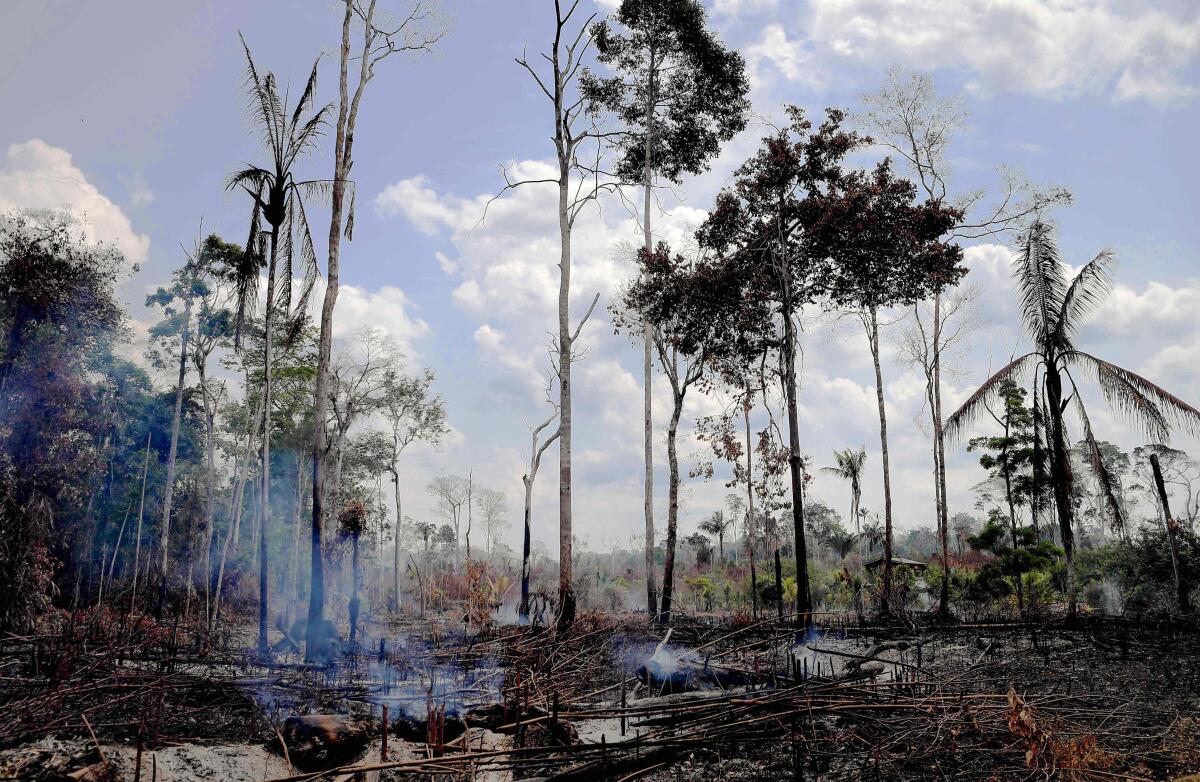
- Share via
Smoke is still rising from the Amazon as fires smolder in the world’s largest rainforest. The blazes triggered a wave of global outrage over the loss of precious trees. But California says it has a plan to keep tropical forests standing.
This week, state officials will consider a proposal to protect these forests by steering billions of dollars to countries such as Brazil. The money would fund government efforts to fight deforestation and promote sustainable industries that don’t involve chopping down and burning trees. And it would come from companies that offset their own emissions by purchasing carbon credits through markets such as California’s cap-and-trade program.
For the record:
8:41 a.m. Sept. 13, 2019A previous version of this story said Louis Verchot was affiliated with the Center for International Forestry Research. He is at the International Center for Tropical Agriculture.
Preserving tropical rainforests is essential to combating climate change — around the world, roughly a third of the greenhouse gases released each year come from clearing forests. And backers say this plan is the best way to funnel much-needed cash toward that crucial task.
Others agree on the pressing need to halt deforestation, but they say California’s plan is a dangerously misguided way to do it. In their view, it would simply allow polluters to keep on polluting without doing anything about the true drivers of forest loss: rising demand for products such as beef, soy and palm oil.
The issue has divided scientists, environmental groups and indigenous leaders who say the Tropical Forest Standard, or TFS, has ramifications far beyond the Golden State. California is a leader on climate change, and approving the TFS could inspire other states, countries and companies to adopt a similar approach.
“This is a critical moment,” said ecologist Christina McCain, who heads the Environmental Defense Fund’s climate initiatives in Latin America. “The world is watching.”
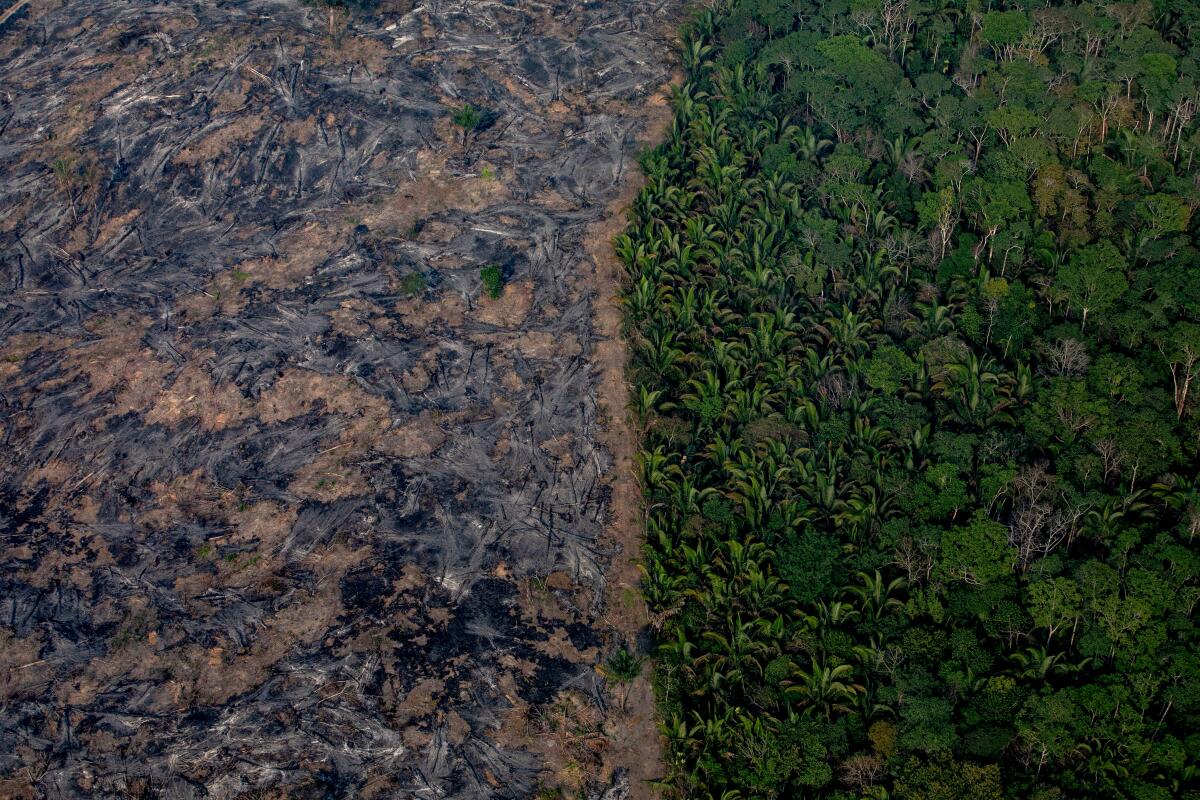
The TFS wouldn’t be the first attempt to fund forest protection through carbon offsets. Several international programs have employed them as a way to preserve and restore forests while lowering the cost of reducing emissions in wealthy countries and funding sustainable development in poorer ones.
Some of these projects succeeded, but others never came to fruition, leaving the fate of the carbon they promised to store in limbo. Many also spelled disaster for people who live in the forest.
Indigenous groups fell prey to unscrupulous “carbon cowboys” who used questionable methods to secure the rights to native land — and its potentially lucrative carbon. People were kicked out of their territories by governments eager to launch conservation projects without local interference.
In any event, the programs never attracted enough money to reach their intended scale, said Louis Verchot of the International Center for Tropical Agriculture, who has studied previous initiatives.
“It wasn’t what you would call a real enabling environment,” he said. “That’s where things are stuck right now.”
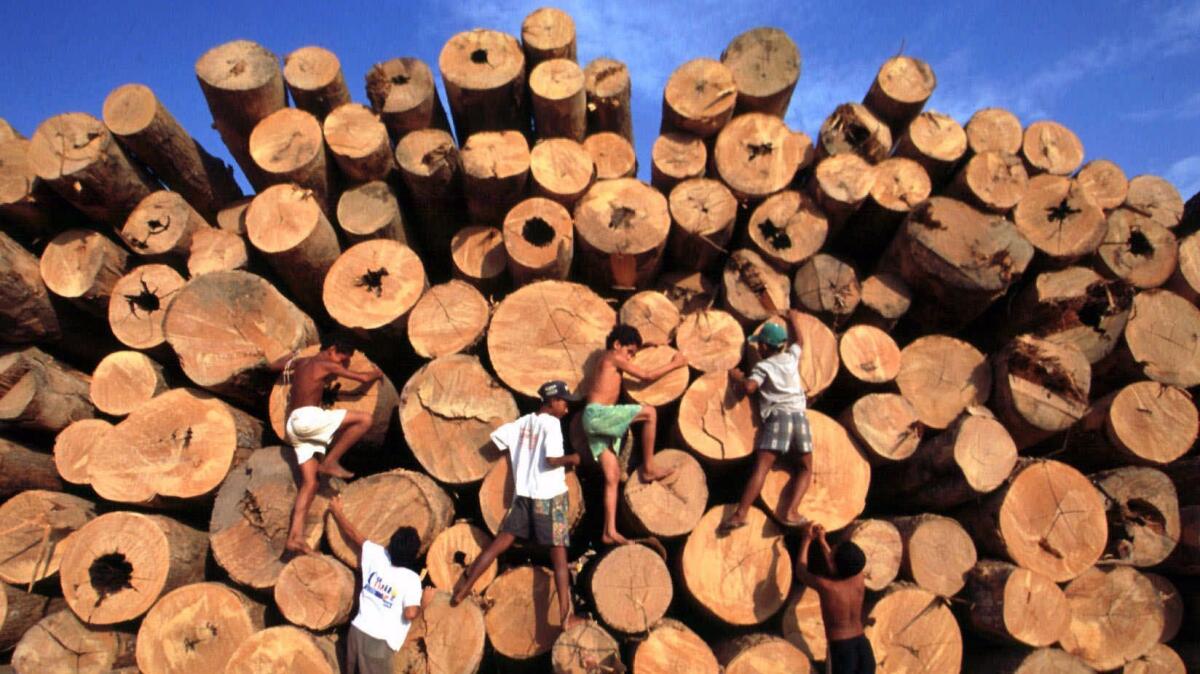
Can the Tropical Forest Standard do better?
Its backers certainly think so. They’ve spent the last decade trying to learn from past mistakes.
The TFS lays out criteria for certifying state, provincial or national governments that want to sell forest offsets, leaving no room for carbon cowboys. Participating governments must commit to reducing deforestation, and they’ll only receive credit for the forest they spare beyond their baseline goal.
Plans must be posted publicly, and progress must be closely monitored and independently verified.
“There will be a ton of eyes on it,” said Jason Gray, the head of California’s cap-and-trade program.
Governments also have to prove that local stakeholders — especially indigenous groups — have a say in the program and stand to benefit from it. The Brazilian state of Acre, which has spent years developing partnerships with tribes, is often cited as a model.
“Indigenous peoples are very well-informed and prepared not to let their rights be violated,” said Francisca Oliveira de Lima, a member of Shawadawa People who works at Acre’s state-run Climate Change Institute. “We are in favor of this California program.”
The TFS tries to address other problems, such as leakage, which occurs when suppressing deforestation in one place simply pushes it elsewhere. That would be difficult to get away with in a state that’s part of the program, said Steve Schwartzman, senior director of tropical forest policy at EDF, a leading supporter of the TFS.
In addition, the TFS mandates that participating states and provinces pony up extra credits as insurance, in case fires or other natural disasters accidentally release carbon that was stored for offsets.
With these safeguards in place, proponents argue the TFS could finally allow real money to flow toward fighting deforestation. Today, less than 1.5% of funding to fight climate change goes to forest protection, according to a new analysis by a coalition of scientific organizations and environmental groups.
Like so much of California’s approach to climate policy, the Tropical Forest Standard is an experiment worth trying.
That has bred frustration in countries such as Brazil, where the government had reduced deforestation by upping enforcement of protected areas but where low levels of investment have failed to create new economic opportunities for farmers, loggers and miners who obeyed the rules, said Dan Nepstad, executive director of the Earth Innovation Institute.
With the TFS, offset money could fund things such as community centers, fish ponds for aquaculture and government programs to support sustainable farming practices.
For California, the reward is the chance to drive greenhouse gas reductions far beyond what the state could accomplish at home, Nepstad said: “The TFS lays out the framework for magnifying that tenfold.”
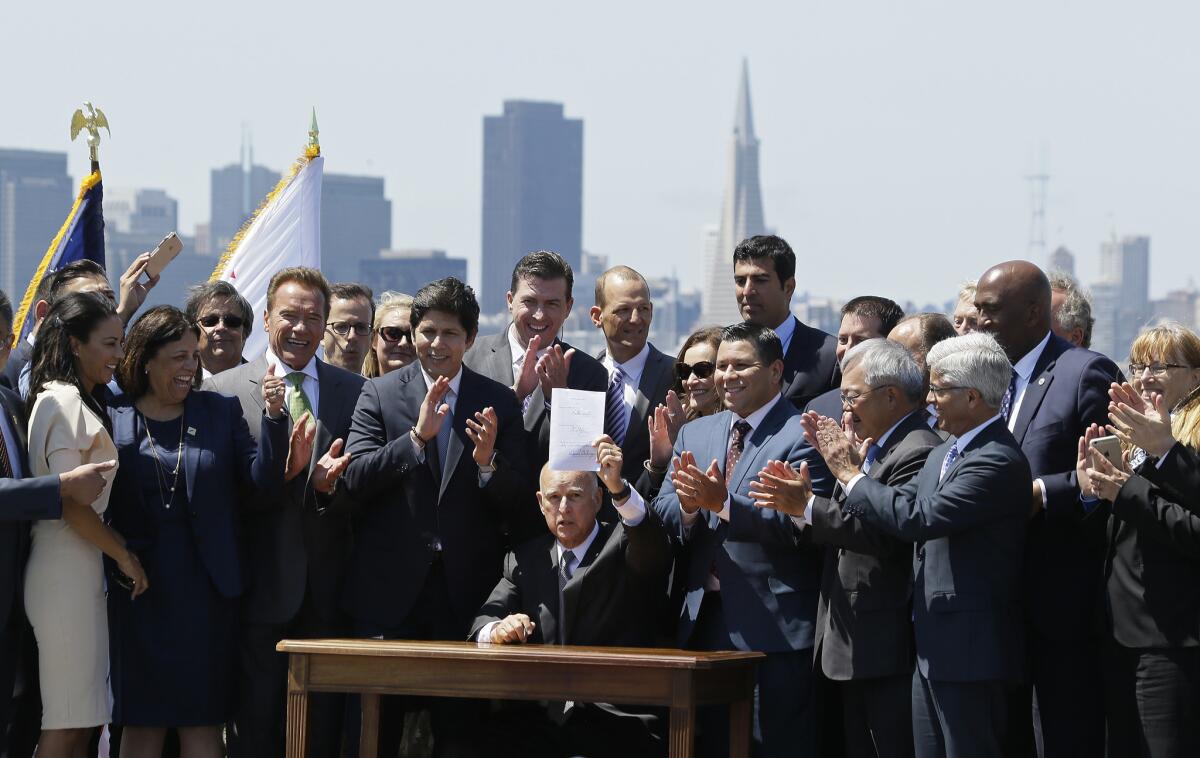
Critics of the TFS object to almost everything about it, starting with the very idea of offsets.
“It’s what we call soft climate science denial,” said Gary Hughes, California policy monitor for the nonprofit Biofuelwatch. “If you are allowing fossil fuel emissions to continue, it’s not doing anything about climate.”
He and other opponents say California’s cap-and-trade program already relies too heavily on offsets — polluters can use them to cancel up to 8% of their emissions in the state — and argue that the TFS would take things even further in the wrong direction.
Chief among their concerns is the legitimacy of tropical forest credits.
Barbara Haya, who studies offset programs at UC Berkeley, worries that leakage will still be a problem, since activities shut out of a participating state can still shift to other states or countries.
It’s also hard to ensure that the program will dole out credit only for carbon savings that wouldn’t have happened anyway. Haya examined two decades’ worth of data and found that a quarter of potential partners would have been able to generate offsets under the TFS’s rules due to declining deforestation rates, even though their progress clearly wasn’t due to the program (it didn’t yet exist).
Then there’s the fear that, despite the TFS’s insurance provision, the carbon that was supposed to offset a polluter’s emissions will end up in the atmosphere eventually, either in a bad fire season or after a change in political leadership reverses a country’s deforestation policies, as happened recently in Brazil.
Others contend that the TFS is based on flawed economic reasoning. So far, the price of carbon offsets on exchange markets is just too low to compete against the forces of global commerce, which make land more valuable than trees, said Tracey Osborne, a geographer at the University of Arizona.
And while advocates for indigenous communities applaud the TFS’s social safeguards, some of them say it will be nearly impossible to ensure they are being honored from afar.
Governments in many tropical countries have a long history of corruption, said Alberto Saldamando, an advisor to the Indigenous Environmental Network. He worries the TFS will only heighten the incentive to coerce or threaten indigenous groups to participate in programs that don’t always serve their interests.
“Carbon, instead of being a poison, is a value, and that perspective leads to all kinds of abuses,” he said.
Opponents raised all these issues last fall, when California’s Air Resources Board first met to consider the standard. It opted to delay a vote and asked legislators to gather input from both sides.
If the board endorses the standard when it meets Thursday, it won’t mean that credits generated under the TFS will be used in the state’s market right away; governments that want to participate would first have to qualify, and then CARB would have to decide whether to accept tropical offsets, Gray said. The motivation to propose the standard now is “to set a very high bar” for forest offset programs in general, he said.
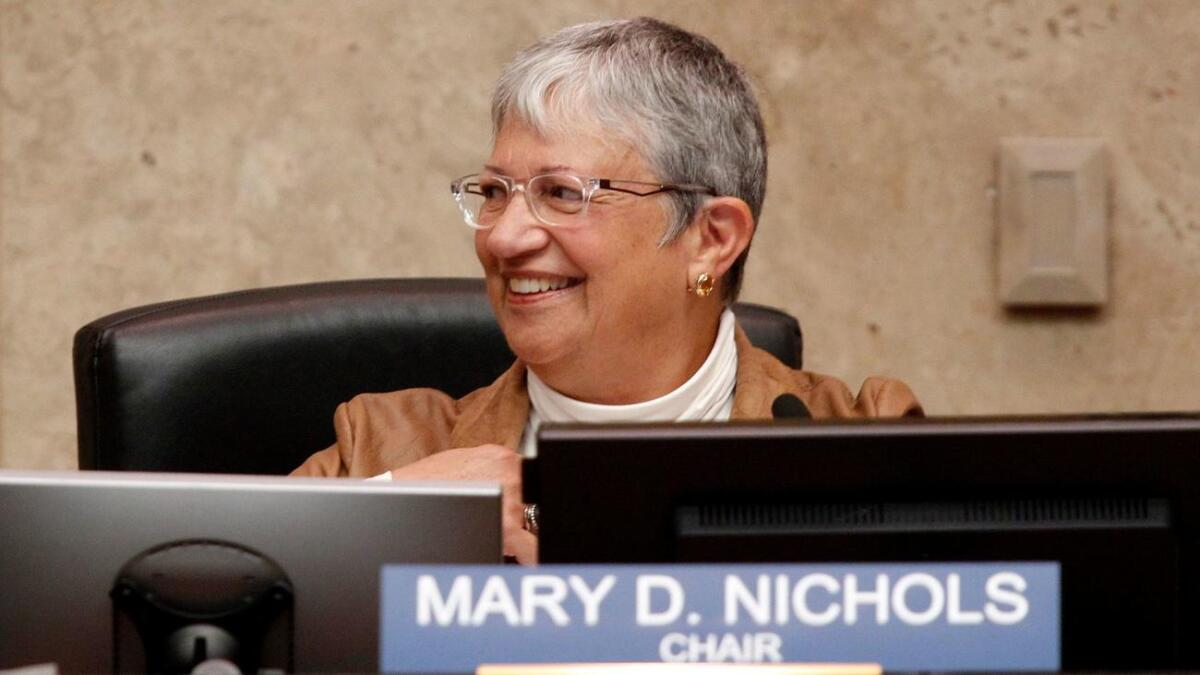
Regardless of whether California ever uses the TFS in its own cap-and-trade program, CARB’s approval would be a powerful endorsement of forest offsets and a setback for efforts to zero out greenhouse gas emissions, opponents said.
Critics would rather see the state focus on other strategies for preserving forests, such as empowering indigenous groups to protect their lands and pressuring companies to rid their supply chains of goods associated with deforestation. (California lawmakers are considering a bill that would require government contractors to do so.)
Haya and more than 100 other researchers laid out their objections to the TFS and submitted them to CARB. Last month, Sen. Bob Wieckowski (D-Fremont) released his own letter imploring the board to reject it.
But supporters are speaking up, too.
In June, four Assembly members encouraged CARB to approve the standard as long as it commits to “vigorous and proactive monitoring” of any government that uses it. More than 100 scientists also penned an open letter endorsing the TFS.
Even though forest offsets carry risks, that doesn’t mean they should be abandoned, said Verchot, one of the letter’s signatories.
“I’m not saying that it’s easy to do this. But it’s also not impossible,” he said. “And the risks of not doing this, I think, are greater.”








